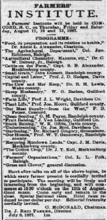You are here
10
In addition to caring for individual patients, Annie Alexander also concerned herself with improving the health of the whole community. As such, she was a pioneer in public health before that field even had a name. Throughout her medical career, Dr. Annie witnessed how disease and poor living conditions contributed to the early deaths of young mothers and children. She devoted her spare time to promoting health and well-being at a time when life in Mecklenburg County, like most areas in the South, lacked good sanitation. Malaria was a particular problem in the humid summers of North Carolina where mosquitoes thrived in undrained ditches, rain barrels and anywhere water could accumulate. The average diet of the poor led to diseases such as pellagra, diabetes, and tuberculosis. Children living in close quarters were susceptible to hookworm and roundworm and succumbed easily to colds, flu, measles, mumps and other communicable diseases.
Though Dr. Annie may have worried about the reaction of the town residents, it did not stop her from sharing her professional knowledge at public events. Shortly after opening her practice, the new doctor, age twenty three, gave a lecture on the connection between food preparation and health at a Farmers’ Institute in Concord, NC. The newspaper clipping below announces Dr. Annie Alexander's talk to the farmers. It reprinted the whole of her remarks on September 6th of the same year.*
- The Charlotte Home and Democrat, July 8, 1887.
